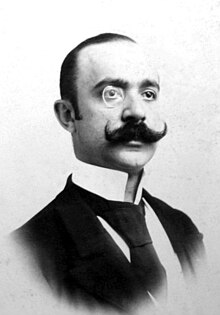I Vicerè
| Federico De Roberto | |
|---|---|
 |
|
| Born |
16 January 1861 Naples, Italy1 |
| Died | 26 August 1927 (aged 66) Catania, Italy |
| Occupation | Novelist |
| Genre | novel |
| Literary movement | Verismo |
Federico De Roberto (16 January 1861 Naples – 26 July 1927 Catania) was an Italian writer, who became well known for his novel I Viceré (1894), translated as The Viceroys . He began his writing career as a journalist for national newspapers, where he met Giovanni Verga and Luigi Capuana, the most prominent writers of the Verismo style. Verga introduced him into the literary circles of Milan. De Roberto authored two books of short stories: La Sorte (1887), Documenti umani (1888). His first novel, Ermanno Raeli, (1889) is largely autobiographical; deeper in psychological analysis is the second, L'illusione (1891). In 1894 his novel I Viceré was published. It was the result of years of hard work, but obtained little success upon its release. Disillusionment and nervous disorders induced De Roberto to resume journalistic work: he became a writer for the Corriere della Sera and the Giornale d'Italia. Only later, after some experience as a playwright, he returned to the novel, with L'Impero, sequel to I Viceré (1908–1913, unfinished).
The novel consists of three parts and is based upon the story of a noble family of Catania, of Spanish origins. This family, the Uzeda princes of Francalanza, were during the previous Spanish rule "Viceré" (that is, they represented the monarch). The plot, fictional but very accurate in describing social and political background, follows the private history of the Uzedas during the last year of Bourbon domination in the kingdom of Two Sicilies and the first decades of Regno d'Italia. It portrays the evolution from feudal rule to a parliamentary system. De Roberto uses the literary style of Verismo (the Italian version of Naturalism). There is no privileged point of view (neither of the author nor others), but rather a plurality of voices. Mass scenes are powerful, and the description of various social backgrounds is rich and deep. The primary aim of all members of the Uzeda family is to retain power regardless of the changes that occur, even if this requires actions that the reader will undoubtedly judge to be cynical, or even absurd. De Roberto portrays a world undergoing fundamental change, but seemingly holds no hope for the future: no aspect of society is represented as free from corruption.
...
Wikipedia
